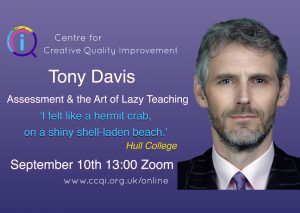Assessment & the Art of Lazy Teaching

Too often, engaging and varied assessment practice is the casualty of a couple of bits of well-established custom and practice: ‘thick’ schemes of work, and the phrase ‘teaching, learning and assessment’. If you’ve a moment, try these tests yourself, and see if you empathise with the challenges. There’s also one more issue, but let’s look at the other two first.
TLA. We say it without really thinking about it. It basically says: We teach. They learn. We check learning. This puts assessment firmly after learning, which far too often results in assessment being ‘summative’. And we should only use summative assessment when they’re just about to walk out of the door at the end of the programme, or at the end of a unit they’re not going to come back to. The rest of the time assessment should be formative, or rather INformative. If it doesn’t inform the next step, the real value of assessment is missing. Take the typical use of Kahoot (et al). Bringing fun into the learning experience is always to be valued, but do people use these magic tools summatively or formatively? Again, if there’s no next step, it’s summative. It’s also worth adding that ‘formative’ isn’t about frequency.. How does your work or the work you observe compare?
Another way of describing formative assessment is ‘assessment for learning’. So should the phrase be: teaching, assessment and learning? One of the aims of next Thursday’s session (May 26th) is to show that teaching and assessment are really one and the same. More about that in a moment.
So what’s my beef about ‘thick’ schemes of work. Again, isn’t this a logical strategy – to get organised before the start of the year? I’ll leave the point that these tomes can stop the essential creativity needed to craft a wonderful emotional learning journey for another time, and stick to today’s theme: assessment. Have you ever seen the cutting and pasting of assessment strategies from one week to the next? I’ve looked at countless schemes, and sadly, too many teachers stick to a very narrow pallet of strategies: Q&A, observation, discussion and marking yet more work. To what extent do these strategies develop learners’ independence? To what extent do they create passivity and/or simply sample the most vocal learners’ understanding?
And that third issue I mentioned at the start is that so often assessment is about the teacher knowing; about the teacher questioning; about the teacher feeding back; about the teacher. Imagine if the assessment strategies you use were about the learner instead. That the strategies enabled the learner to see what they should do next. Not only does this significantly lighten the teacher’s load (hence the title of the session: Assessment & the Art of Lazy Teaching), but it also equips learners with the essential expert, independent learning skills they need to do well on and beyond the course.
In next Thursday’s open session (May 26th) I’ll be introducing delegates to my Fifty Shades of Assessment – 50 learner-centred, formative assessment strategies that are not about the teacher Q&Aing or marking yet more work. And with the session using game-based learning you don’t have to fear being outfaced by so many wonderful and inventive strategies. You’ll walk away with a sweetshop full of resources, many of which you’ll already have had a go at applying, and a sketch of a research lesson. Last week, I saw a lovely Twitter post from a delegate who posted that they’d just had an amazing lesson using assessment strategies 2 and 10. That was day made, for sure.
Here are a few other favourite comments about the impact of this session:
- ‘I felt like a hermit crab, on a shiny shell-laden beach.’ Hull College
- ‘It was like entering an art gallery and finding yourself staring at 50 masterpieces, each worth the time to study it.’ Bath College
- ‘This is the first training session in a very long time that I have come away feeling excited and motivated. It has reminded me why I do this job and given me the inspiration to make a real difference within the classroom.’ B-Skill Limited
- ‘A whirlwind of excitement of new ideas.’ Coleg Cambria
- ‘My brain feels soaked in knowledge.’ Stoke College
And one of my favourites (for people of a certain generation!)
- ‘As if by magic, the shop keeper appears.’ Chesterfield College
Do join us if you can, and do please tag any of your colleagues who might be interested, and/or share with your own networks if you’re able. As usual, booking details can be found here: www.ccqi.org.uk/assessment-art.
Hope you can join us. Thanks for reading.
Best wishes
Tony
#FE #assessment #c4cqi #JoyFE #UKFEchat #TonyDavis




Comments
No comments yet